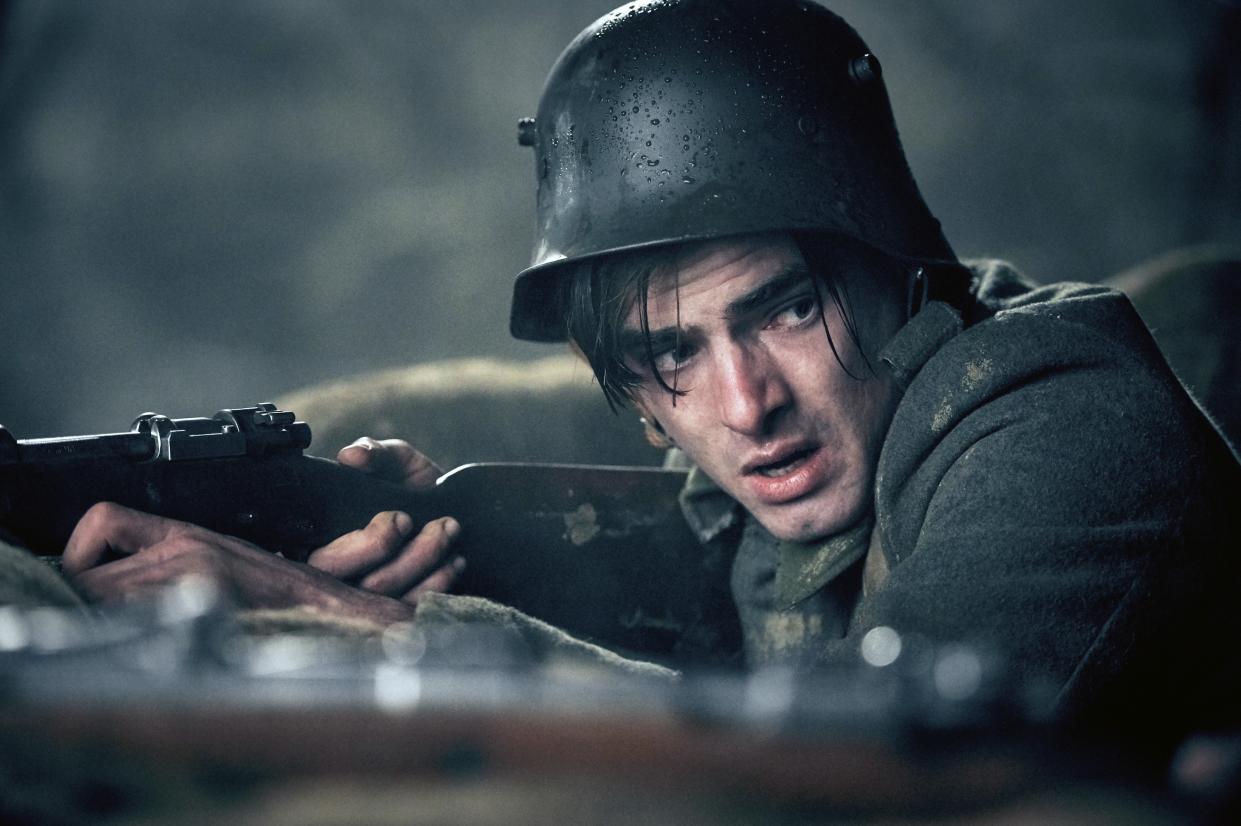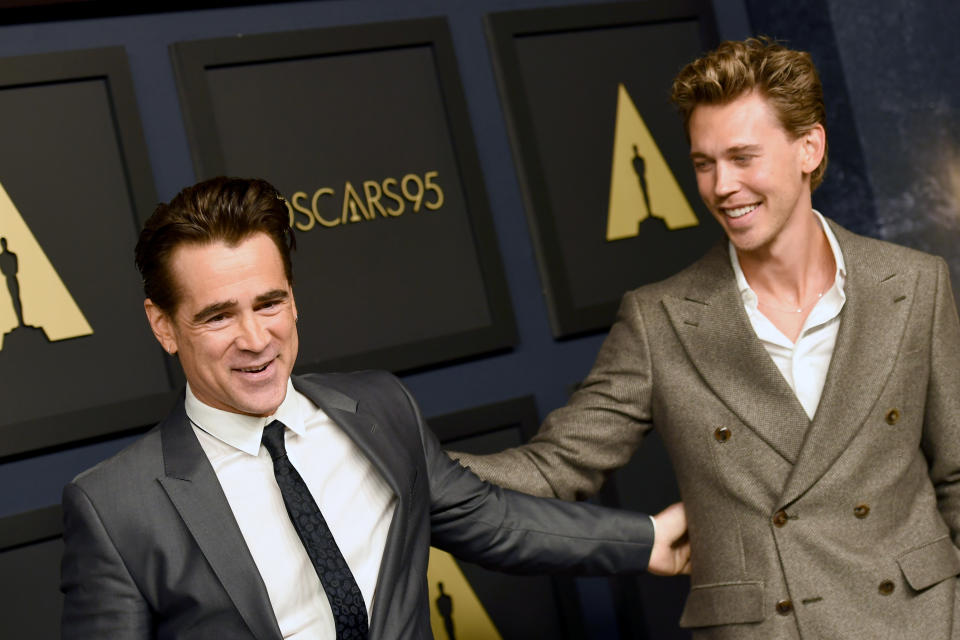What the BAFTAs Mean for the Oscars: Watch Out for ‘All Quiet on the Western Front’

- Oops!Something went wrong.Please try again later.
- Oops!Something went wrong.Please try again later.
- Oops!Something went wrong.Please try again later.
- Oops!Something went wrong.Please try again later.
The British Academy of Film and Television Arts Awards (BAFTAs) are often quite predictive of the Oscars, as there’s some overlap between BAFTA voters and the Academy. And unlike last year, the BAFTA winners (along with next Sunday’s SAG Awards) could impact Oscar voting, which commences March 2 and ends March 7 ahead of the ABC awards show on Sunday, March 12. (See all the winners here.)
It was a pleasure to see BAFTA nominees like actresses Danielle Deadwyler (“Till”) and Viola Davis and her “The Woman King” director Gina Prince-Bythewood smiling on the red carpet Sunday, even if they didn’t take home any awards. These days, the BAFTAs use juries to open up their nominations slots to a more diverse slate of talent. But given the chance, this year voters leaned white, overlooking Oscar favorites Angela Bassett, Michelle Yeoh, and Ke Huy Quan, among others.
More from IndieWire
Jerry Bruckheimer's 7-Step Formula for 'Top Gun: Maverick' Is Worth Hollywood's Attention
Oscars 2023: Here's How 'All Quiet on the Western Front' Could Dominate the Craft Races
While most Academy voters don’t watch the BAFTAs on Britbox, they see who wins, and winning momentum always matters. Last year, “The Power of the Dog” won the Best Film BAFTA as well as Best Director for Jane Campion, who did repeat at the Oscars. Eventual Best Picture Oscar winner “CODA” was not up for Best Film but took home Best Adapted Screenplay, as it did at the Oscars. Paul Thomas Anderson won the Best Original Screenplay BAFTA for “Licorice Pizza,” and Kenneth Branagh’s “Belfast” won Best British Film, ahead of winning Original Screenplay at the Oscars.
While last year’s Best Actress went to Joanna Scanlan (“After Love”), BAFTA winners repeating at the Oscars included Will Smith (“King Richard”), Ariana DeBose (“West Side Story”), and Troy Kotsur (“CODA”). “Summer of Soul (or, When the Revolution Could Not Be Televised)” won the Best Documentary BAFTA for Ahmir “Questlove” Thompson ahead of its Oscar win, and Ryusuke Hamaguchi’s “Drive My Car” won Film Not in the English Language ahead of the Best International Feature Oscar.
Going into the BAFTAs with the most nominations (14) was Edward Berger’s lauded European feature “All Quiet On The Western Front” (Netflix), which dominated the night, winning not only the expected Best Film Not in the English Language but a total of seven BAFTAs including Best Director and Best Film, breaking the BAFTA record for the most awards won by a film not in English.
The World War I film started out the awards show by winning Adapted Screenplay for director Edward Berger and UK writers Lesley Paterson and Ian Stokell, beating out Oscar nominee “Living” from London’s Kazuo Ishiguro. (But the film was not competing with the current Oscar frontrunner, Sarah Polley’s “Women Talking,” which was not a BAFTA nominee.) The hugely popular German period war film also won Cinematography for Brit James Friend (as it is expected to do at the Oscars), beating Oscar nominee “Elvis,” as well as in Sound over Oscar nominees “Avatar: The Way Of Water,” “Elvis,” and “Top Gun: Maverick,” and Best Score, over Oscar nominees “Babylon,” “The Banshees Of Inisherin,” and “Everything Everywhere All At Once.”
“All Quiet on the Western Front” has a strong wind in its sails heading for the Oscars.
Expected to win a clutch of BAFTAs with 10 nominations was homegrown favorite “The Banshees of Inisherin.” But the Martin McDonagh film took home just four wins, including a surprise Best Supporting Actor for Barry Keoghan, who beat his costar and fellow Oscar nominee Brendan Gleeson, as well as Oscar frontrunner Ke Huy Quan (“Everything Everywhere All at Once”). Supporting Actress (Kerry Condon) prevailed over Oscar nominees Angela Bassett (“Black Panther: Wakanda Forever”), Hong Chau (“The Whale”), and Jamie Lee Curtis (“Everything Everywhere All At Once”) and included in her thanks her horses and dogs. And McDonagh won Best Original Screenplay over Oscar nominees “Everything Everywhere All At Once,” “The Fabelmans,” “Tár,” and “Triangle Of Sadness,” and accepted Outstanding British Film. But that was it.

JC Olivera/Getty Images
In the shocker of the night, BAFTA frontrunner Colin Farrell (“The Banshees of Inisherin”) lost Leading Actor to his fellow Golden Globe winner Austin Butler for incarnating “Elvis.” This gives Butler a big boost going into the SAG Awards next week. Catherine Martin also gains momentum in the Costume race with her “Elvis” BAFTA win; the movie also beat out Oscar frontrunner “The Whale” for Make Up & Hair, and won Casting as well for a total of four wins.
“Elvis” did lose Production Design to fellow Oscar nominee “Babylon,” marking that film’s only win of the night.
Coming up short was the Daniels’ American favorite “Everything Everywhere All at Once,” which took home the coveted DGA Award on Saturday. Going into the BAFTAs with 10 nominations, “Everything Everywhere All At Once” star Yeoh lost the Leading Actress prize yet again to Australian actress Cate Blanchett as a renowned orchestra conductor in Todd Field’s European-flavored “Tár,” for the film’s only win. Like Farrell, Yeoh won in the Comedy category at the Globes when she was not in direct competition against her rival. Nor did Quan win the BAFTA for Supporting Actor, ruining his sweep. The chaotic action comedy had to settle for one win: Best Editing, beating Oscar nominees “The Banshees Of Inisherin,” “Elvis,” and “Top Gun: Maverick.”
It was a good night for Netflix with a total of eight wins, as Animated Film went to “Guillermo Del Toro’s Pinocchio” over Oscar nominees “Marcel The Shell With Shoes On,” “Puss In Boots: The Last Wish,” and “Turning Red.” That should repeat on Oscar night.
Also likely to repeat at the Oscars is the VFX BAFTA winner, James Cameron’s “Avatar: The Way of Water.”
While “Fire of Love” took the DGA Documentary prize on Saturday, the BAFTA went to a movie that is close to home in Europe, the politically timely “Navalny,” beating Oscar nominees “Fire of Love,” “All That Breathes,” and “All the Beauty and the Bloodshed,” leaving this category extremely hard to call at the Oscars.
Among the shorts, Oscar animated short nominee “The Boy, The Mole, The Fox and the Horse” built some momentum, winning British Short Animation, while live-action short nominee “An Irish Goodbye” won British Short Film.
Best of IndieWire
Sign up for Indiewire's Newsletter. For the latest news, follow us on Facebook, Twitter, and Instagram.

